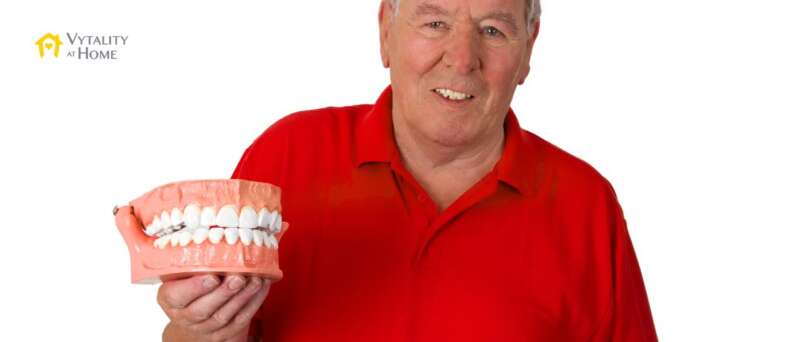Crunch time: Eat your way to better oral health
Are you one of the 24% of all Canadians aged over 15 who wear dentures?
Whilst that may seem a high figure, that doesn’t mean that everyone who wears dentures have no natural teeth remaining. According to Statistics Canada, on average, only 22% of denture-wearing Canadians aged between 60 and 79 are edentulous (i.e. have have no natural teeth). The Canadian Longitudinal Study on Aging (CLSA) surveyed people aged 45 to 85, and found that 92% had at least one natural tooth remaining.
Food for your teeth
So, if you wear dentures and have natural teeth remaining too, how can you improve your oral hygiene and help keep those natural teeth healthier for longer? The answer may lie in what you eat. You can help keep teeth and gums strong by including some foods alongside your daily oral health routine of brushing twice a day, flossing between teeth, and proper denture cleaning. You should also have regular dental check-ups (more on the new initiative to help low income seniors access dental care below).
Eating for better teeth and gums
If you already eat a healthy diet, you’re already helping you teeth and gums stay healthy. By making a few changes, you can boost that benefit even more.
Drink more water (and less sugary drinks)
When you drink water, you are giving your mouth, gums and teeth a wash! Drinking water helps “flush” away any left-over food particles in your mouth. Naturally occurring bacteria in your mouth turn the sugars in fruit juice and sugary drinks into acid, which can attack the enamel on your teeth. Drinking water help neutralize and rinse away these acids.
Enjoy your tea
We Canadians love our tea – we imported 40,770 tonnes of it in 2020! Drinking a cup of tea, either black or green, can also help your oral health:
“Compounds in tea work to fight bacteria, reduce acid in your mouth and also reduce the enzymes that turn starch into teeth-decaying sugar. Antioxidants in tea can also help reduce inflammation, something that is important if you suffer from gum disease.”
If you add sugar, however, that will eliminate the benefits of drinking the tea. If you drink a lot of tea and are worried about it staining your teeth, brush after drinking or have a glass of water to rinse away the tannins.
Delight in dairy products
You may have been encouraged to drink milk as a child to help strengthen your teeth. The tooth-strengthening benefits of eating foods rich in calcium such as cheese, milk and yogurt continue throughout your life. Cheese also contains the protein casein that helps strengthen tooth enamel. If you are unable to eat dairy products, many nut milks have added calcium and naturally occurring vitamin D, which helps your body absorb calcium.
Get crunching
Crunchy vegetables act like a natural toothbrush, cleaning the surface of the teeth. Many are also rich in vitamins including vitamin A (in celery) and vitamin C (carrots), which both aid tooth health. As we age, our natural saliva production may decrease leading to the feeling on a dry moth. Most raw vegetables have a high water content, which can encourage saliva production. Eating apples can also help stimulate saliva production, and if you eat the peel, it contains beneficial antioxidant flavonols too.
You can also crunch on nuts; almonds, Brazil nuts and hazelnuts have high levels of calcium, vitamins and minerals. However, they are also highly calorific, so keep the portion size small!
Better access to dental care for seniors in 2023
Thanks to the new public dental care plan, access to dental care for seniors on lower incomes should become considerably easier in 2023. According to a survey by Statistics Canada, 20% of Canadian have avoided dental check-ups and treatments due to the cost. Previous dental care initiatives have been only available for the very lowest of earners, but according to Don Davies, MP (Vancouver Kingsway);
“By the end of 2023, every senior making under $75,000 per year will have access to dental care. You know what seniors they are? They are almost every senior in Canada.”
For the latest information, see this link.
Caregiver helping someone with their oral care?
Dental Hygiene Canada have produced a helpful guide for those who need to assist others with their oral health. You can download it for free here.
Oral hygiene assistance from Vytality at Home
Our caregivers offer oral hygiene as part of our personal care home care service. Our home care visits can also include help with meal planning and grocery shopping, as well as assistance getting to medical and dental appointments. Contact us for more details and to discuss your requirements:




